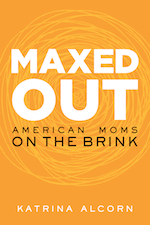My friend Jane* has a problem. She works full-time for a government agency in California and has two little girls in preschool. Jane is really good at her job. Jane is losing her mind.
“All I do is work, run home to pick up screaming kids because it’s 5:30 and they’re tired. Wrestle through the evening with them, then clean up the house, go to bed, and do it again.”
Jane told me this one evening over the phone, after we’d both wrestled our kids into bed.
“There’s no personal time,” Jane said softly, so as not to wake the kids. “I’m a hairs-breadth away from a breakdown.”

In the 60s, Betty Freidan named the depression and anxiety women suffered "housewife syndrome." Today we seem to have a disturbingly similar problem. "Working mom syndrome"?
Jane isn’t alone. Up to 30 percent of mothers of young children were reportedly depressed in 2003. Many more suffer from anxiety. Experts say this is partly caused by extreme exhaustion. [1] An online survey by Working Mother Magazine found that a whopping 91 percent of working moms who took the survey had experienced depression. [2]
Coincidentally, Jane’s employer also has a problem. California is in a major budget crisis, and funding for government services like the ones Jane’s agency provides are being slashed.
Do you see where this is going? Jane has the perfect solution. She wants to cut back her hours from 40 to 28 per week and take the 75% pay cut. This would mean a reduction in some of her benefits, but Jane and her husband agree it’s worth it.
Here’s the best part. Jane says she will do the same amount of work in less time. And she knows she can do this because union rules allowed her to work a 75% schedule for one year after her maternity leave. Her annual review during this time was glowing. She’s even willing to split the hours between four days or five, in case her employer wants the consistency of having her in the office every day.
This is one of those rare win-wins. Jane gets to keep her sanity. Her department gets to save taxpayer money without losing productivity. It’s a no-brainer, right?
Wrong!
It’s not that simple. There are rules. There’s paperwork. There’s a union. There are several layers of management…Jane started the process in January 2010. She got approval from her boss and her union. But when it came time to get approval from her boss’ boss, things hit a snag.
“I need to check with a few people…” the boss’ boss said.
That was three weeks ago. Then silence.
“What’s the hold up?” I asked. I was getting mad on her behalf. I’m Jane’s friend. I’m a taxpayer. I have a double stake in this.
“I don’t really know. There’s a lot of tension between the union and management. It makes things very inflexible. No one wants to change anything because they’re afraid they won’t be able to change it back,” Jane said. “But then again, maybe the hold up is my boss’ boss’ boss.”
“Does he have kids?”
“No. He’s a nice guy. Everyone is nice where I work. But he’s, you know, he’s definitely one of the guys. Mid-50s. No kids. Not a lot of sensitivity around this stuff.”
“So what are your other options?” I asked.
“Well, if I just push myself and have a mental breakdown, then I could get a reduced schedule.”
“Uh, seriously?”
“Yeah. I’d have to get a doctor to fill out the disability forms. They’d say for my mental health, I can’t work more than 28 hours a week. That would be easier to get approved. There’s a precedent for disability.”
As someone who just went that route a year ago, I can’t help but think there’s a better way.
*Not her real name. Everything else here is true.
[1] Perfect Madness: Motherhood in the Age of Anxiety, by Judith Warner, 2006. p. 128.
[2] Press release by Working Mother Media, Dec. 3, 2008:
An extreme majority of American working moms have experienced depression, according to a survey from Working Mother magazine conducted in conjunction with a revealing article on depression in their December/January issue. The survey results underscore just how widespread the problem is, with a staggering 91.4 percent of respondents having experienced depression. Not only that, but more than half of depressed working moms don’t seek help and hide their suffering…As successful working moms, 60.7 percent said depression felt like a “personal failure.”





{ 7 comments… read them below or add one }
I don’t think it matters whether you are a working Mom, or a full time stay home mom, personal time seems to hold no value. I’m on a one week “break” right now and four days in have yet to find a moment of personal time. I’m glad to have the time to catch up at home, but that’s all there is. I wish I knew the solution, but I don’t have time to think of one right now because I have to load kids up for school and help them finialize science fair projects…
It’s time for change. Decades have passed with no meaningful workplace reforms that would benefit parents. There are solutions. We just need to act on them.
There’s no question that balancing work and home life as a parent is insanely difficult and the people who don’t get it REALLY don’t get it. That’s a major reason I’ve stayed at the company I’m at for going on 12 years (YIKES that’s a long time). There are a number of reasons I stay, despite it being a telemarketing firm, but chief among them is that they are VERY flexible and supportive of my needs as a parent. I can work from home once a week, leave at 2 to pick up my kid from school and, if I have to, even bring him to the office for that last 2 hours of the day (I do that as rarely as possible since it makes for a VERY UNPRODUCTIVE last 2 hours of the day as I’m sure you appreciate). That kind of benefit is priceless – and just enough to keep me there year after year…
I think it is common for a mom’s “I think I can” attitude to interfere with us facing the fact that we commit to too much. One body can only move for so long, two arms can only hold so much, and one brain, well, let’s face it, we said goodbye to that a long time ago. We all know that something must change but what? When I see other moms out, multi-tasking their faces off, I wonder, ” Do they feel like this too? Have mom’s always felt like this? And if so, why are we pretending that we don’t?” I feel like we, too often, feel the need to portray this image of, “I’ve got it all under control and then some” ugh. Why you gotta make me look bad? Seesh.
Earlier someone commented that there are solutions, but what? Don’t store them in your back pocket! Do share, friend! And back to my original statement, maybe all it takes is saying goodbye pride and hello reality: I cannot continue to do this much work AND ACT ON IT. Is it time to find a nanny, house keeper, or a new job? Guess it depends on the situation…
It never works, of course…. having small children and attempting to maintain my partnership at a national law firm proved impossible – the ‘part-time’ policy required performance in the ‘first tier’ (ie, those shooting the lights out, something I did before the children were born because all I did was work and I truly had no clue or frankly, interest, in children at that stage of life) not less than 80% work schedule (which meant working not less than 40 hours/week as ‘standard’ partner hours are 50+). The loss in respect from fellow lawyers and inability to staff my files was instantaneous and deleterious. 40 hours a week allowed no downshift, only more tragic, lost days of panic, anxiety, stress, verging on a breakdown and questioning everything – what was the point?
So now I am at home, going half-crazy with tedium, half-crazy with delight at being part of my young children’s daily life, but always always asking myself if it is the right choice – will I be unable to regain my professional career later? Will it really be better for the children than if they were with a full-time nanny? I watch the clock constantly thinking… only 3 more hours until bedtime…. only 2 more hours…. one …… Is this all there is to life as a mom/working mom/confused mom?
There are definitely no right answers, but it’s important to know that there are so many women going through the same situation. I felt better after reading Leigh Martin’s book on Good-bye Working Mom Syndrome (I found it on Amazon.com). It made me laugh and made me realize that there are some things we can do to alleviate some stress, but most of all, is I’m not alone 🙂
{ 1 trackback }